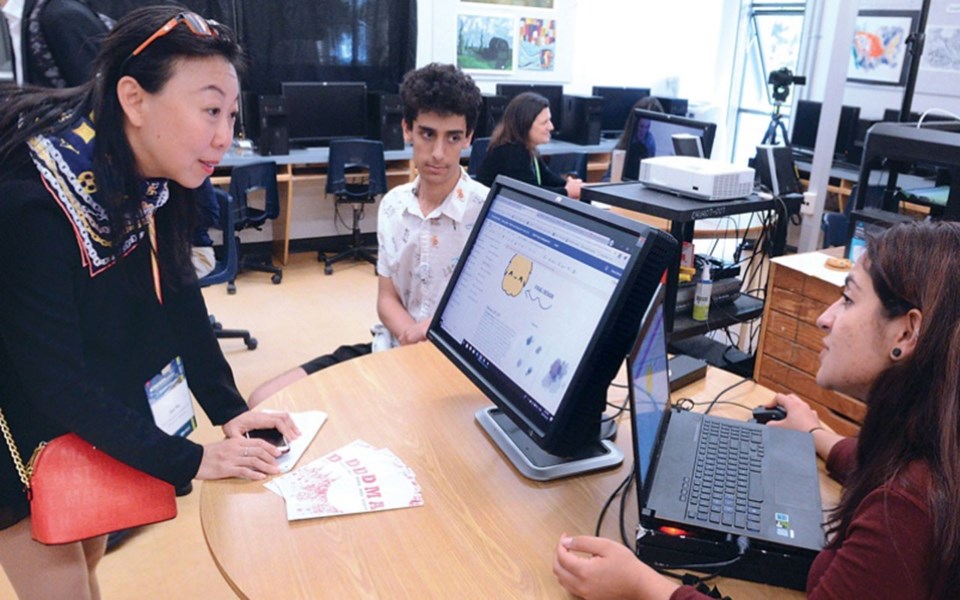North Vancouver public schools are ahead of the curve when it comes to student engagement was the consensus among international education delegates who toured two high schools here last week.
Argyle and Mountainside were two of four B.C. schools selected to be showcased for the world’s top education policy-makers on Friday.
Recent changes to B.C.’s curriculum, including a focus on student choice and cross-curricular connections, were of interest to the 200 delegates from the Organisation for Economic Co-operation and Development, comprised of almost 40 member nations.
At Mountainside the education envoy learned how community partners, including counsellors and doctors, are integrated into the programs at the school that supports student learning outside of a traditional classroom setting.
Students tending to a chicken coop and beehive, part of a Sustainability 11/12 course offered at the school, caught the eye of OECD student delegate Daniela Rodrigues, who overall was impressed by the open learning concept at Mountainside.
“[The students are] really free but with limits. I went to one room and they could choose what they wanted to do a project about – and that’s really cool. They can explore their horizons and open their minds,” said Rodrigues, a Grade 11 student from Portugal.
The depth in which students can explore and create is really impressive, remarked Sharon Cheers, an independent schools representative from Sydney, Australia.
"There’s a real optimism and expectation that all students will succeed – and I think we really saw that at Mountainside," said Cheers.On Friday afternoon the OECD group moved on to Argyle, where principal Kim Jonat extolled the academic, arts and athletic qualities of the school.
Jonat drew the delegate’s attention to Argyle’s Digital Media Academy – an enriched hands-on program that regales tech-savvy students from across the district because of its industry connections.
“There’s lots of opportunities for them to gain real-world experiences that are authentic,” explained Jonat of the Digital Media Academy students, who recently toured tech giants Google, Apple and Facebook’s headquarters in the Silicon Valley.
Inside the Digital Media Academy classroom, students were keen to show the visiting education leaders their programming prowess.
Teachers Murray Bulger and Susanne Chow were also on hand to explain the fundamentals of the academy, which sets students up for career opportunities in digital media, science, engineering, art and technology.
Through self-directed learning, students apply curriculum content to real-world projects of their choosing, so long as they are meaningful, have a universal connection, and take feasibility into account.
Project management and problem solving are some of the core skills gained by the students, who also work with industry clients.
“So it’s really important for our students to come up with ideas that are meaningful to them ... because at the end of the day when you have a student who is really into the work that they do – you can’t stop them,” said Chow.
First-year academy student Tristan Voth was paired up with German delegate Kerstin Wilmans, showing her a video game that he created in part with the help of online tutorials.
Voth has the landscape mapped out, and is now working on character development.
“It’s taken a long time,” revealed Voth, who said he’s solved many problems to improve the game, including learning how to create a climbing system.
Wilmans, who works in Berlin as a curriculum developer, was impressed with Voth’s video game design and the underlying concepts being absorbed.
“What I find super interesting is that Tristan really likes what he is doing,” said Wilmans. “I’m impressed with this energy to really self-study.”
Investing in these kinds of programs is key for student outcomes and meeting 21st century workplace needs, according to Wilmans.
“The funds to really finance the infrastructure, the change in curriculum, you have to make space – and actually we [in Germany] are behind [B.C.] in some ways,” said Wilmans.
North Vancouver School District Supt. Mark Pearmain was on hand as the OECD education delegates toured Mountainside and Argyle. Pearmain said it’s been a wonderful learning experience for both parties.
“I think what’s interesting is that while education and how it’s run in different countries is obviously going to be different – the similarities and the challenges that we grapple with are the same,” said Pearmain.
Asked how he feels having the North Vancouver School District in the international spotlight, Pearmain said his hope is two-fold for the students.
“One, that they get to understand that people are interested in what’s happening in B.C. and recognize that the program that they’re in – it’s pretty impressive and it’s very progressive. And secondly, that they get pride in their own school; that there’s amazing things going on and they get to show it off,” said Pearmain.
The Vancouver conference last week marked the first time the OECD met in North America, as it undergoes an international rethink about the goals and competencies students need to thrive in a rapidly changing world.




